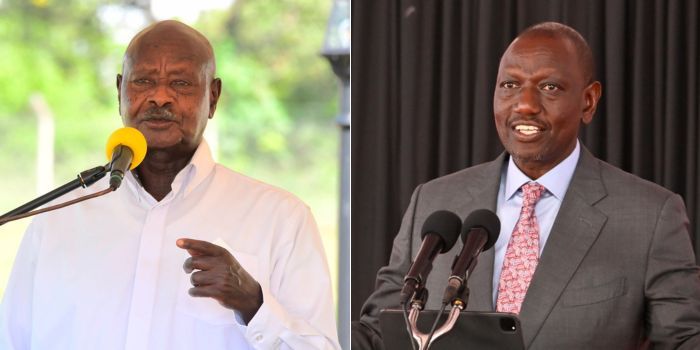President William Ruto is set to meet Uganda President Yoweri Museveni to iron out their diplomatic tiff, East African Community, ASALs, and Regional Development Cabinet Secretary Peninah Malonza has stated.
Malonza said that the two Heads of State have scheduled a sit down after Kenya blocked Uganda from using the Kenya Pipeline Company (KPC) infrastructure to move its refined petroleum products from the Mombasa port to Uganda under a new arrangement as directed by Uganda’s Cabinet.
“There is a scheduled meeting between the two presidents to discuss the impasse and Kenya will also seek to explain its position at the next East Africa Community (EAC) Heads of State Summit,” Malonza told journalists as quoted by Daily Nation.
She further dismissed fears that the trade standoff might pose a threat to fostering diplomatic ties between the two nations, expressing confidence that the meeting will yield positive resolutions.
“There is no cause for alarm because such trade disagreements are normal. Each country is founded on different laws and principles, that is why we deal with each other based on the binding treaties and other diplomatic protocols,” she said.
“Uganda is not only Kenya’s trading partner. It is also the largest market for Kenyan oil, Nairobi and Kampala have coexisted very well since independence and both countries value each other’s economic potential.”
In November last year, Uganda cut its oil deals with Kenya citing that they have been sourcing oil products from middlemen in Kenya at exorbitant prices which exacerbated the country’s fuel crisis.
“Without my knowledge, our wonderful people, were buying this huge quantity of petroleum products from middlemen in Kenya,” Museveni wrote on X.
“A whole country buying from middlemen in Kenya or anywhere else!! Amazing but true.”
Uganda imports more than 90% of its petroleum products through the Port of Mombasa in Kenya and the rest through the Dar es Salaam port in Tanzania.
The importation was done independently by the licensed Ugandan Oil Marketing Companies (OMCs) however through the importation structures in Kenya and Tanzania.
Come January 2, 2024, Uganda sued Kenya for denying its entity, the Uganda National Oil Company (UNOC), rights to operate as an Oil Marketing Company (0MC) in Kenya.
Through the UNOC, Uganda had sought to move fuel products through Kenya Pipeline but was directed to register as an oil marketer in Kenya by the Energy and Petroleum Regulatory Authority (EPRA) to use the pipeline.
EPRA had asked UNOC to fulfill several requirements, among them; business registration certificates, identification documents for all directors, work permits, tax compliance certificate, proof of financial capability including proof of sales volumes of 6.6 million litres of super petrol/gasoil or A1jet or kerosene in Kenya, evidence of operating five licensed retail stations and operating a licensed depot with a turnover of USD 10 million over the last three years.
UNOC could not provide all the required documents and found some of the requirements a burden, arguing that it was a fully State-owned company in Uganda that only sought to transport the products through Kenya and had no intention of doing business in Kenya.
Uganda has now taken the case to the East Africa Court of Justice (EACJ), holding Kenya’s government responsible for this delay in granting exemptions to operate without EPRA’s requirements.



